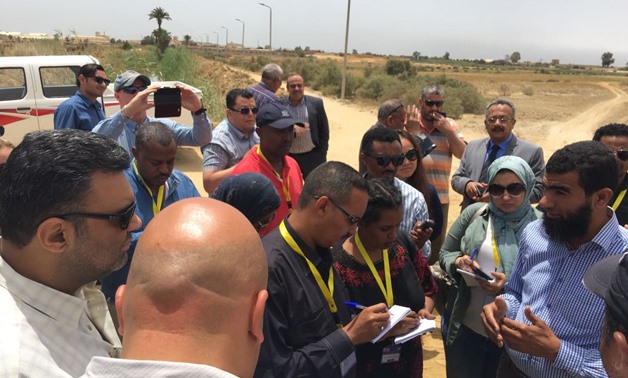
Stockholm International Water Institute organized a visit for several journalists from Nile Basin countries to Fayoum governorate on Wednesday.
CAIRO – 10 May 2018: Stockholm International Water Institute organized a visit for several journalists from Nile Basin countries, including Egypt, Sudan, South Sudan and Ethiopia, to Fayoum governorate on Wednesday.
The visit aimed to introduce the journalists with farmers’ daily challenges, which they have to deal with as a result of the lack of irrigation water. During the tour, the journalists discovered that the lack of the water affected 5,000 acres of land that became unsuitable for agriculture.
The tour included Bahr Wahby Canal, Abdel Hady Weir and Khalt al-Bats Estuary, along with several irrigation projects in the governorate.

Nile basin journalists during their visit to Fayoum governorate, southwest Cairo, on Wednesday, May 10 – Press photo
Egypt has been going through talks with most African countries regarding water security in the African region, especially discussing the Nile River issue and how to protect all Nile Basin countries’ rights and shares of water without affecting each others.
Excessive efforts have been made lately, inxluding several high-profile visits and conferences between Egypt and several African countries, especially Sudan and Ethiopia, to discuss the Ethiopian Grand Renaissance Dam (GERD) issues, which is considered to be a “matter of national security,” according to several officials’ statements.
Egypt depends entirely on Nile water for drinking and irrigation purposes, reiterating consistently its "historical right" to the river guaranteed in the 1929 and 1959 Nile agreements, which granted the country 87 percent of Nile water and the right to veto or approve irrigation projects in the upstream countries.
Since 2014, Egypt, Sudan and Ethiopia have held several tripartite meetings and agreed on the Declaration of Principles. However, the dispute between the countries relates to the filling and operation of the dam; Egypt demands that this period be 7 to 10 years, while Ethiopia insists on a maximum of 3 years.

Nile basin journalists during their visit to Fayoum governorate, southwest Cairo, on Wednesday, May 10 – Press photo
Egypt’s average water-per-capita is expected to drop from 663 cubic meters per year to 582 cubic meters by 2025, according to the Central Agency for Public Mobilization and Statistics (CAPMAS). Addis Ababa, however, claimed that the dam is necessary for Ethiopia’s development and will not harm downstream countries.
In 2011, Ethiopia started the construction of the 6,000-megawatt Renaissance Dam over the Blue Nile River, one of the major sources of water that forms the Nile River downstream. Concerns have risen in Cairo and Khartoum over the negative impact the Ethiopian dam will have on their historic Nile water share, amounting to 55.5 billion cubic meters in Egypt only, in accordance with the historic 1959 agreement with Sudan.



Comments
Leave a Comment